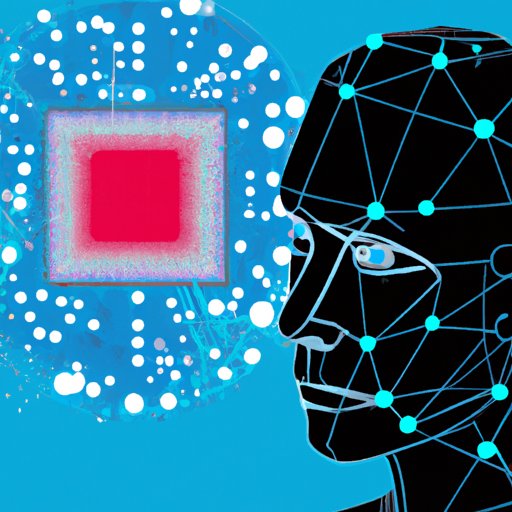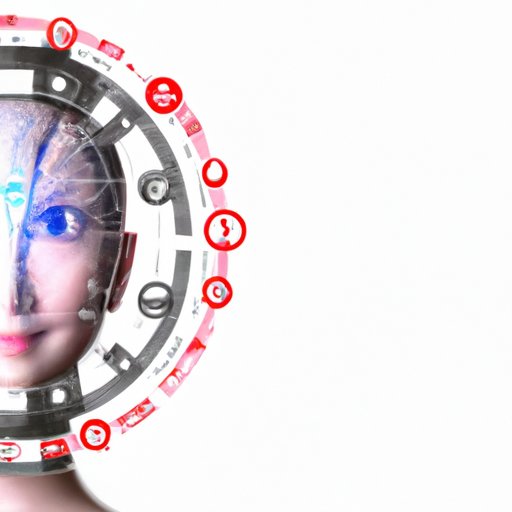Introduction
AI singularity is a concept that has been gaining traction in recent years, as advances in artificial intelligence (AI) have enabled machines to perform tasks that were once thought to be impossible. Put simply, AI singularity is the point at which AI surpasses human intelligence, resulting in a radical shift in the way that humans interact with technology. This article will explore the potential benefits and risks associated with AI singularity, as well as the implications for society and the future of technology.

Exploring the Potential of AI Singularity
AI has come a long way since its inception in the 1950s. Today, machine learning algorithms are being used to automate processes, detect patterns, and make decisions that would have taken humans hours or days to complete. According to a report by the McKinsey Global Institute, “AI technologies have the potential to create economic value of around $13 trillion by 2030, more than the current output of China and India combined.”
The impact of AI on society has been immense, from automating mundane tasks to improving decision making. As AI continues to advance, the potential for AI singularity becomes increasingly real. In a matter of decades, AI could potentially surpass human capabilities, leading to a new era of technology.
The potential benefits of AI singularity are far-reaching. Automation and improved decision making could lead to increased efficiency and productivity, while advanced AI systems could help to identify and solve complex problems. AI could also improve the quality of life for many people, providing access to healthcare and education services that were previously unavailable.
The Impact of AI Singularity on Society
The rise of AI singularity could have a profound effect on human life. Many jobs that are currently performed by humans could be automated, leading to changes in the labor market and the way that people work. AI could also have an impact on privacy and security, as machine learning algorithms become increasingly sophisticated and able to identify patterns in data.
In addition, AI could lead to new forms of entertainment and communication. For example, virtual reality and augmented reality could be used to provide immersive experiences, while intelligent chatbots could enable users to communicate with machines in natural language.
How AI Singularity Could Change the Future
The possibilities for AI singularity are endless. With the right technology, AI could be used to create autonomous vehicles, smart cities, and even intelligent robots. AI could be used to improve healthcare and education, helping to diagnose diseases and provide personalized instruction to students.
However, there are still many challenges that must be addressed before AI singularity can be achieved. Implementing AI requires massive amounts of computing power and data, and developing algorithms that can learn and adapt to changing environments is no easy task. In addition, ensuring that AI systems are secure and reliable is essential.

Understanding the Risks Associated with AI Singularity
Although AI singularity could bring about great benefits, there are also risks that must be considered. AI systems are not perfect, and there is always the possibility of unintended consequences. For example, AI could be used to manipulate public opinion or to control certain aspects of society.
In addition, ethical considerations must be taken into account. AI systems could be used to discriminate against certain groups of people, or to make decisions without considering the potential ramifications. Finally, regulatory issues must be addressed, as governments grapple with the implications of AI on their societies.
Examining the Benefits of AI Singularity
Despite the risks associated with AI singularity, there are also numerous benefits that must be considered. Increased efficiency is one of the most obvious advantages, as AI systems could be used to automate processes and reduce costs. AI could also improve decision making, enabling businesses to make better decisions faster.
In addition, AI could have a positive impact on the quality of life. AI systems could be used to monitor air quality, detect disease, and provide personalized care to patients. AI could also be used to create immersive experiences, allowing users to explore virtual worlds and engage in interactive entertainment.

Analyzing the Possibilities of AI Singularity
Although AI singularity is still in its infancy, there are already numerous applications being developed. Autonomous vehicles, facial recognition systems, and natural language processing are just some of the possibilities that are being explored. In addition, AI is being used in industries such as healthcare, finance, and retail to improve customer service and automate processes.
As AI continues to evolve, the potential for AI singularity will only increase. Already, researchers are working on systems that can learn from experience and make decisions without human intervention. In the near future, these systems could lead to a new era of technology and a fundamental shift in the way that humans interact with machines.
Conclusion
AI singularity is an exciting prospect, with the potential to revolutionize the way we live and work. However, it is important to consider the risks associated with AI, as well as the potential benefits. By understanding the implications of AI singularity, we can ensure that AI is used responsibly and ethically.
In conclusion, AI singularity could lead to a new era of technology, with AI systems capable of performing tasks that were once thought to be impossible. With careful consideration of the potential risks and benefits, AI could be used to improve the quality of life for all and create a more efficient and secure society.
(Note: Is this article not meeting your expectations? Do you have knowledge or insights to share? Unlock new opportunities and expand your reach by joining our authors team. Click Registration to join us and share your expertise with our readers.)
